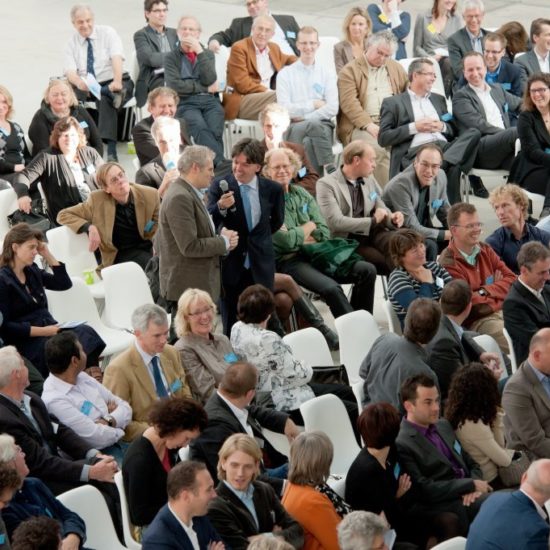Walter Faaij is a corporate anthropologist. He looks at businesses and organisations as if they were tribes and applies his knowledge of groups and ancient rituals to them.
We asked him to take a look at the role of the moderator in meetings and events and to explain it from an anthropological perspective.
The moderator as shaman

A great moderator can turn an ordinary meeting into an inspirational happening. A ritual aimed at the creation of connection and a sense of community, at inspiration and being moved, at an experience.
If your meeting is actually a ritual and the participants feel themselves become members of a tribe, however temporarily, then the facilitator is, in fact, a shaman.
“A meeting has a creative power. And who is the one to guide that power? Precisely, the moderator. He or she, in collaboration with the organisation, creates the physical space and sets the stage to get people into the right state of mind. To celebrate, inspire, connect, bid farewell, change, and resolve conflict. The moderator not only creates the physical space but the space in time and the mental space, or psychological security, for participants - both speakers and listeners - to reflect on what is said, but, above all, to ask questions, to interact and to express themselves.
The MC moderates the diverse expectations and perspectives, needs, interests, and even points of view. He or she lays the groundwork for the dialogue but also for any unease that can arise as a consequence of the differences between people. The moderator has the important task of ensuring that different voices are heard so the listener can form an opinion about them. To invite people to speak freely but also to listen with an open mind. With the willingness to be moved, to postpone judgement, to change your mind.
The moderator as shaman
From an anthropological point of view, the role of the moderator can be compared with that of the shaman. Alongside the chief, the hunters and the gatherers, the shaman has an important role in the tribe. They are about meaning and purpose, are in contact with the gods and they help tribe members interpret the future. They are the people who tribe members go to for advice. Their questions help them find answers.
Shamans are also in contact with everybody and are an interchange of social information. However, they are also a bit frightening because they know a lot and can do things that no one else can. They can work magic. That also makes them a threat to the status quo.
The shaman has to have the authority, charisma and freedom to help interpret what happens. A shaman has the persuasiveness and perseverance necessary for those times when things become tense, and the status quo is threatened.
That is why the shaman also has to be allowed a lot of freedom because if some things can’t be said or some voices are not heard, then dialogue is poorer and the risk of sabotage increases. The shaman must also have the charisma to tempt tribe members into a different kind of conversation with each other. That is, by definition, a bit strange because a lot of organisations are more used to having transactional conversations than transformational ones.
Shaman with 'super' skills
And finally, it helps enormously if the shaman has a number of ‘super’ social skills, like empathy and compassion for everything and everyone (even for the asker of the endless question), listening well (to what the subtext is and what is actually being said), the ability to breakthrough politeness, to get to the point (“You mean that it is a bad idea?”) and to occasionally be the barometer (“It seems to me that...”).
For an inspirational meeting, you need a moderator with charisma and authority, freedom and connection, and ‘super’ social skills. A moderator lays the groundwork for honest dialogue, to allow confusion, uncertainty and exploration and room for the differences between people. And if the group loses its way, the moderator says: “You’re not lost; you’re here”. And I’m here with you.
Conclusion
To organise a meaningful meeting - particularly in times of change - you can’t squeeze a Tuesday morning meeting with bad coffee and an endless agenda into just half an hour. Those are transactional meetings. In times of change, you have to organise transformational meetings where people have extraordinary conversations and experiences, light campfires and have meaningful interaction. That is what people take away with them, what provides new insights and promotes new behaviour. It is in this that the moderator has an essential role.
Walter Faaij
Foto: Anthony Levlev op Unsplash

Together, we make the best match!
We know our moderators better than anyone. We understand your needs. We will gladly help you find the best solution.
